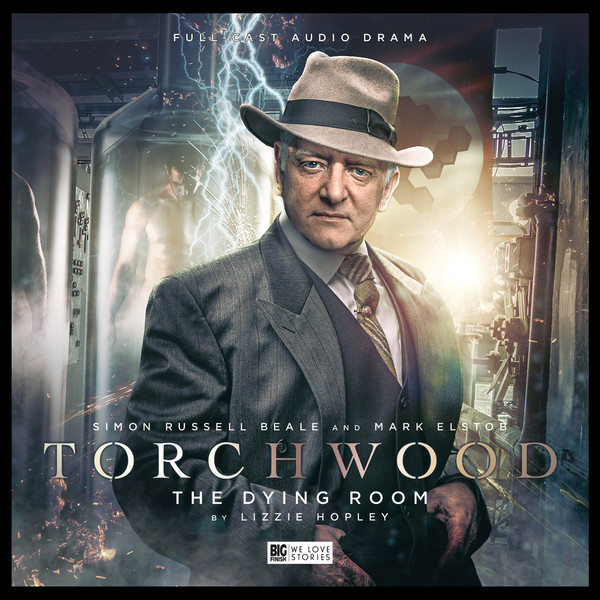The joy of a show like
Torchwood, once you free it from the confines of episodic TV and make it an
anthology audio series, is that it has a long history and a longer future in
which you can set stories. Big Finish has certainly taken advantage of that
potential since it took over the rights to tell Torchwood stories – it’s taken
us back to Victorian, original Torchwood, forward into the far future with the
Torchwood Archive, ahead of the TV show but with its core cast, across the
Atlantic to Torchwood America in the mid-seventies, back before vital team
members died, and even back before the formation of Torchwood Cardiff as we
know it, with the Canary Wharf, moderately fascistic, undoubtedly pro-Brexit
Torchwood London. What we’ve never seen till now – ironically enough, given
where we first encountered Captain Jack Harkness – is Torchwood’s War. What
were the protectors of the Empire doing while Hitler’s horrors were marching
across Europe being homicidal and gittish to everyone who wasn’t them?
It’s perhaps a more loaded
question than one might at first expect – Torchwood’s moral core has always
been at the very best a murky, gritty, human grey, rather than anything clear
and clean and shining, so you could make an argument that they wouldn’t, in
principle, be against Nazi ideas in principle. But on the other hand, Torchwood
has always been rooted in an arrogance, a self-possession, and a belief that it
should be the custodian of all the most dangerous alien artefacts, both because
it is responsible enough to know the ‘right’ thing to do with them, and because
of its fundamental core belief – that the ‘right’ thing to do with them is to
keep Britain safe and advance her interests, rather than those of any other
nation.
The Dying Room, by Lizzie
Hopley, introduces us to at least a little of what Torchwood was up to during
World War II, and there’s a grimness and a gravitas to it that befits the
situation. In terms of a scenario, it’s more or less a tight two-hander, with
occasional expansion outside the so-called Dying Room. And for the most part,
it shows us an interrogation of a quiet academic by the Nazis.
It’s worth mentioning that
the academic, M LeDuc, is played by Simon Russell Beale, because that will give
you an idea of the calibre of performance at work in this audio. Mark Elstob
too, as Herr Grau, the interrogator, is pitch perfect throughout this story,
which for the most part sings like an agitated violin, on just a handful of
notes, wearing your resistance down and leaving you raw and tense, but
absolutely unable to turn away from it – don’t try and listen to The Dying Room
while you’re doing something else, and don’t try to do it in chunks, however
great the temptation is to give yourself a breather from the intensity of it.
It deserves you, all the way through, not just because of course real people
died in real rooms at the hands of real men and women with fanatical zeal, but
also because the writing, the direction and the performances are set that high,
that tense, that to break your concentration during The Dying Room is to do
everyone involved a disservice – including yourself.
If you’re thinking that a
Nazi interrogation doesn’t sound terribly Torchwood, don’t despair – there’s
plenty of creepy weirdness going on outside the room, with a virus that turns
people into slavering, unintelligible monsters. That in fact is the pretext of
the interrogation – Grau smells Torchwood at work, and tries to prove that
LeDuc is something to do with it all.
There’s a vibe of ‘wartime
Usual Suspects’ about the whole thing, and we the listener suspect, with Grau,
that there’s more to LeDuc than meets the eye fairly early on, but what is actually going on is a refreshing
surprise when we find it out, bringing an Indiana Jones ripple of satisfaction,
and a justice that pleases, without being pinpoint-guessable till the pieces
are meant to fall into place. Along the way, we also discover more or less
where Torchwood’s heart actually lies in the whole ‘conflict of nations’ and
get a brave, modern but believable repudiation of Nazi and supremacist
ideologies into the bargain.
Torchwood The Dying Room
is not, at almost any point, fun. It’s a Nazi interrogation, you don’t expect
fun from that scenario. What it is though is tense, sweaty, nerve-shredding
drama, played by some excellent actors, and directed by Scott Handcock like the
18-rated version of a black and white war film. It’s one to pick up for its
dramatic qualities, and for the experience of going through it, rather than
because it will give you a happy hour. But like all the best dramas, you’ll
emerge at the end of it feeling like you’ve been through the emotional wringer,
but that it was well worth the journey.


No comments:
Post a Comment